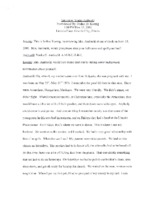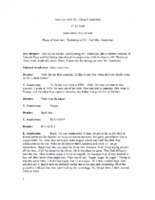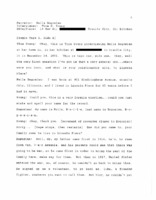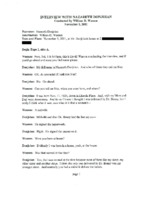Fall 2001 Granite City Oral History Interviews (43 total)
These oral histories were conducted for the History 447: Approaches to Oral History course taught by Anne Valk in the fall 2001 semester at Southern Illinois University Edwardsville. The majority of the interviews are with residents of Granite City, many of them residents of the Lincoln Place immigrant community.
- Collection: Fall 2001 Granite City Oral History Interviews
| Thumbnail | Title | Description | Date | Date Added |
|---|---|---|---|---|
 |
Leland Ambuehl Oral History Interview | This oral history interview with Leland Ambuehl was part of oral histories conducted in the fall 2001 semester of History 447: Oral History. Leland Ambuehl came to Lincoln Place as an adopted child from Eastern Europe. In this interview, he talks about his adoption, his experiences in World War II, the diversity of Lincoln Place, and the Lincoln Place Athletic Club. |
October 28, 2001 | February 16, 2018 |
 |
Venka Ambuehl Oral History Interview | This oral history interview with Venka Ambuehl was part of oral histories conducted in the fall 2001 semester of History 447: Oral History. Born to Bulgarian immigrant parents in 1925, Venka Ambuehl spent her whole life in Lincoln Place. In this interview, she talks about growing up in this diverse community and how much it shaped the way she sees the world. From events at the local community center to an array of traditions this multicultural community used to celebrate Christmas, she talks in-depth about her younger years at Lincoln Place. |
November 15, 2001 | February 17, 2018 |
 |
Edward Asadorian Oral History Interview | This oral history interview with Edward Asadorian was part of oral histories conducted in the fall 2001 semester of History 447: Oral History. Born to Armenian immigrant parents in the 1920s, Edward Asadorian talks in-depth about the importance of retaining his cultural roots and passing those traditions on to his own kids. He also explains how his father came to this country and his families close relationship to the local Armenian priesthood. |
November 14, 2001 | February 17, 2018 |
 |
Mary Asadorian Oral History Interview | This oral history interview with Mary Kambarian Asadorian was part of oral histories conducted in the fall 2001 semester of History 447: Oral History. Mary Asadorian was born and raised in Lincoln Place, where she spent her life. In this interview, she talks about her childhood, the role of the Armenian Orthodox Church, the diversity of Lincoln Place, the community center, and her family heritage. |
October 27, 2001 | February 18, 2018 |
 |
Nelle Bogosian Oral History Interview | This oral history interview with Nelle Bogosian was part of oral histories conducted in the fall 2001 semester of History 447: Oral History. Nelle Bogosian was born to Armenian parents and spent most of her life in Lincoln Place. In this interview, she talks about her parent’s escape from the Armenian Genocide and lack of US recognition for the event, her schooling and social experiences in Lincoln Place, the community center, pool hall, and different cultural celebrations within the Lincoln Place community. |
November 1, 2001 | February 20, 2018 |
 |
Mary Bogosian Carson Oral History Interview | This oral history interview with Mary Bogosian Carson was part of oral histories conducted in the fall 2001 semester of History 447: Oral History. Mary Carson was raised in Lincoln Place where she spent most of her life. In this interview, she talks about her childhood, the diversity of Lincoln Place, the “Clubhouse” where kids would spend their time, and the 1940s basketball championship team. |
November 10, 2001 | February 20, 2018 |
 |
Millie Chandler Oral History Interview | This oral history interview with Millie Chandler was part of oral histories conducted in the fall 2001 semester of History 447: Oral History. Millie Chandler was born and raised in Lincoln Place until she moved in 1951. In this interview, she describes her childhood, the diversity of the community, playing music in the community center, and how she felt outside communities viewed those that resided within Lincoln Place. |
October 29, 2001 | February 20, 2018 |
 |
Carmen Cook Oral History Interview | This oral history interview with Carmen Cook was part of oral histories conducted in the fall 2001 semester of History 447: Oral History. Carmen Cook was born at Lincoln Place in 1943, where she spent most of her life, to Mexican immigrant parents. In this interview, she talks about her childhood and life, the ethnic diversity of the community, the Cinco de Mayo celebrations, the legacy of Ruben Mendoza (the Olympic soccer player), and the scholarship that was set-up in the name of Joe Gonzalez. |
November 18, 2001 | February 20, 2018 |
 |
Richard and Susan Depigian Oral History Interview | This oral history interview with Richard and Susan Depigian was part of oral histories conducted in the fall 2001 semester of History 447: Oral History. Richard and Susan Depigian discuss life in Lincoln Place and their Armenian heritage. They share information about the customs and traditions, as well as the “clans” that developed out of, their heritage. The ethnic diversity of Lincoln Place is addressed. Both Richard and Susan discuss their parents experienced during the Armenian genocide. |
November 17, 2001 | February 20, 2018 |
 |
Nazareth Donjoian Oral History Interview | This oral history interview with Nazareth Donjoian was part of oral histories conducted in the fall 2001 semester of History 447: Oral History. Naz, as he is better known by, was bom November 22, 1924. His father was a chef and ran a tavern and boarding house for many years. Naz also owned and ran a tavern for a number of years. While in high school, Naz got a job at the U.S. Army depot just down the street and worked there for part of his senior year. After graduation, he worked there a short period of time at the depot before being drafted, he entered the U.S. Army in June 1943 and was assigned to the U.S. Army Air Corps. He received training as a airplane and engine mechanic and spent a total of32 months in the military. The war ended before he was shipped overseas and upon discharge he returned to Granite City. He had return rights to his former job at the depot. After being home for two weeks and listening to his dad constantly asking him when he was going to get a job, Naz returned to work a the depot. He held a number of jobs and over the years suffered a number of Reduction In Force (RIF) realignments of personnel. However, after each RIF he was fortunate enough to move up in pay grade and after forty two years of combined military and civilian service, retired as a GS-12. |
November 3, 2001 | February 20, 2018 |
